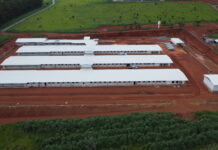The Food and Agriculture Organisation of the United Nations (FAO) has constructed six water ponds in Rulindo, Rwanda where there is high demand for water for vegetable growers.
Water needs from Rulindo farmers and the capital, Kigali remains a challenge for local farmers.
To improve the water management for the farmers, FAO says it has constructed six water ponds to support the Yanze Horticulture Production Cooperative (YAHOPROC).
The Yanze River’s water is collected in the ponds before it reaches the fields through three solar-powered pumps. The system provides a constant source of water that is evenly distributed to all the fields, including those that are difficult to reach due to the hilly terrains.
The farmers are now able to grow vegetables all year long and sell their produce to buyers in Kigali. Jean d’Arc, and Mubaranyanga.
“We no longer sit idle during the sunny season, worrying about how we can irrigate our crops. There is no such problem now. We have water and a machine which automatically pumps it for us,” a local farmer, Jean d’Arch Mubaranyanga said.
The solar-powered pumps also save on fuel costs for the farmers and help increase the production.
According to FAO, Mubaranyanga noted that he planted on 2 acres, but barely harvested 60 kg of broccoli per season.
However, since he started using this solar-powered pump, he can easily harvest 200 kg on the same acreage.
The irrigation system allows farmers to cultivate enough food and ensure healthy diets their families.
“We could not eat vegetables before, now our nutrition is improved. Now, we have fruits and vegetables in every meal we have. We no longer have malnutrition issues. Children don’t suffer from kwashiorkor (severe malnutrition),” Mubaranyanga said.
Some 150 kilometers southeast from Rulindo, in Ngoma district, the most drought-prone province in Rwanda, FAO has built a spring catchment tap to collect water for the local communities.
Spring water is usually fed from sand or gravel water-bearing soils, or from water flows through fissured rock. A spring catchment tap channels the natural outflow of groundwater into a pipe delivering safe water for consumption and irrigation.
For many years, Alphonsine Mukeshimana, a 47-year-old farmer and mother of eight travelled for three hours every day to fetch water for home use.
This time-consuming task took away valuable time from Alphonsine and her children. In addition, the water fetched was not clean and has caused health problems for the family.
“My children and I had to fetch very dirty water, which always caused us intestinal worms,” said Mukeshimana.
The spring water has also become a source of safe water for the members of the community.
Josepha Mukamana, the FAO RWEE project manager said: “After seeing how cooperative members don’t have clean water, the idea of shooting two birds with one stone came. Now they can irrigate their crops and get clean water for their sanitation and nutrition.”
Through the “Rural Women Economic Empowerment” (RWEE) programme and the “Knowing water better” (KnoWat) project, FAO is working to promote sustainable access to water resources in Rwanda. Support is given to women farmers and have limited access to agriculture inputs due to their low economic capacity.
Gualbert Gbehounou, the FAO country representative in Rwanda said: “This is what FAO, the UN is all about.”
“To make sure that we add our modest contribution to what can make the lives of rural women conducive to unleash their potential. Having access to water removes an impediment to the agricultural production of rural women. They can grow crops, rear livestock, and even produce fish, no matter the season. They provide their families with healthy food and even improve their incomes,” he said.








